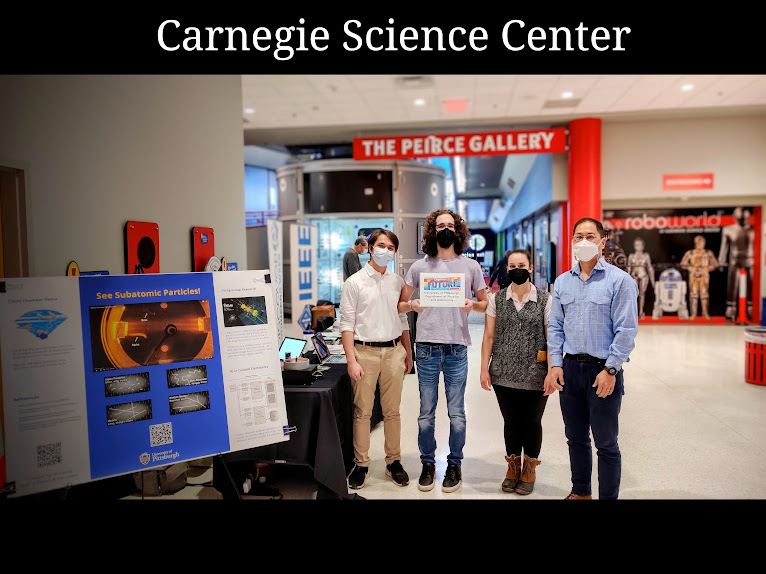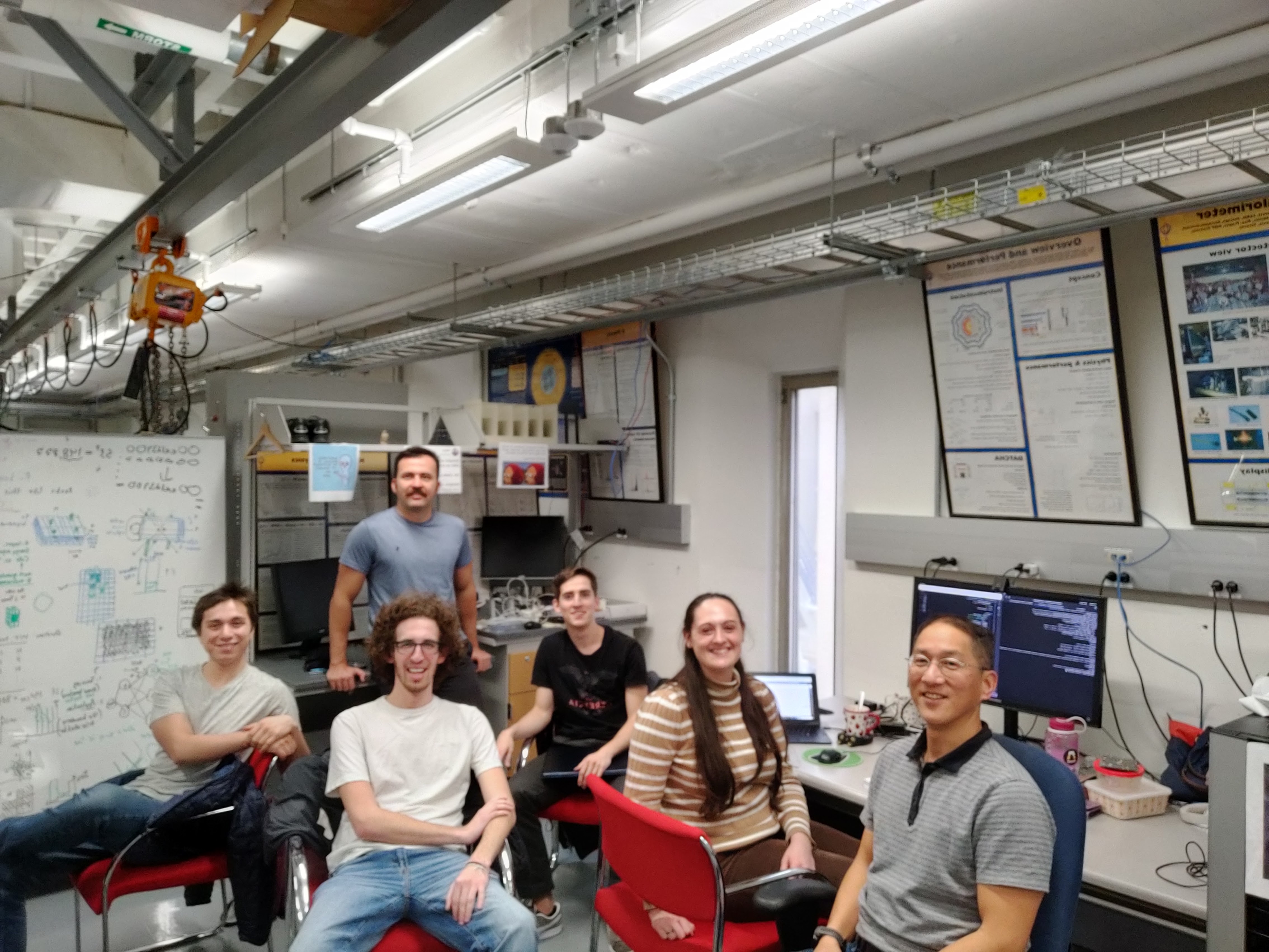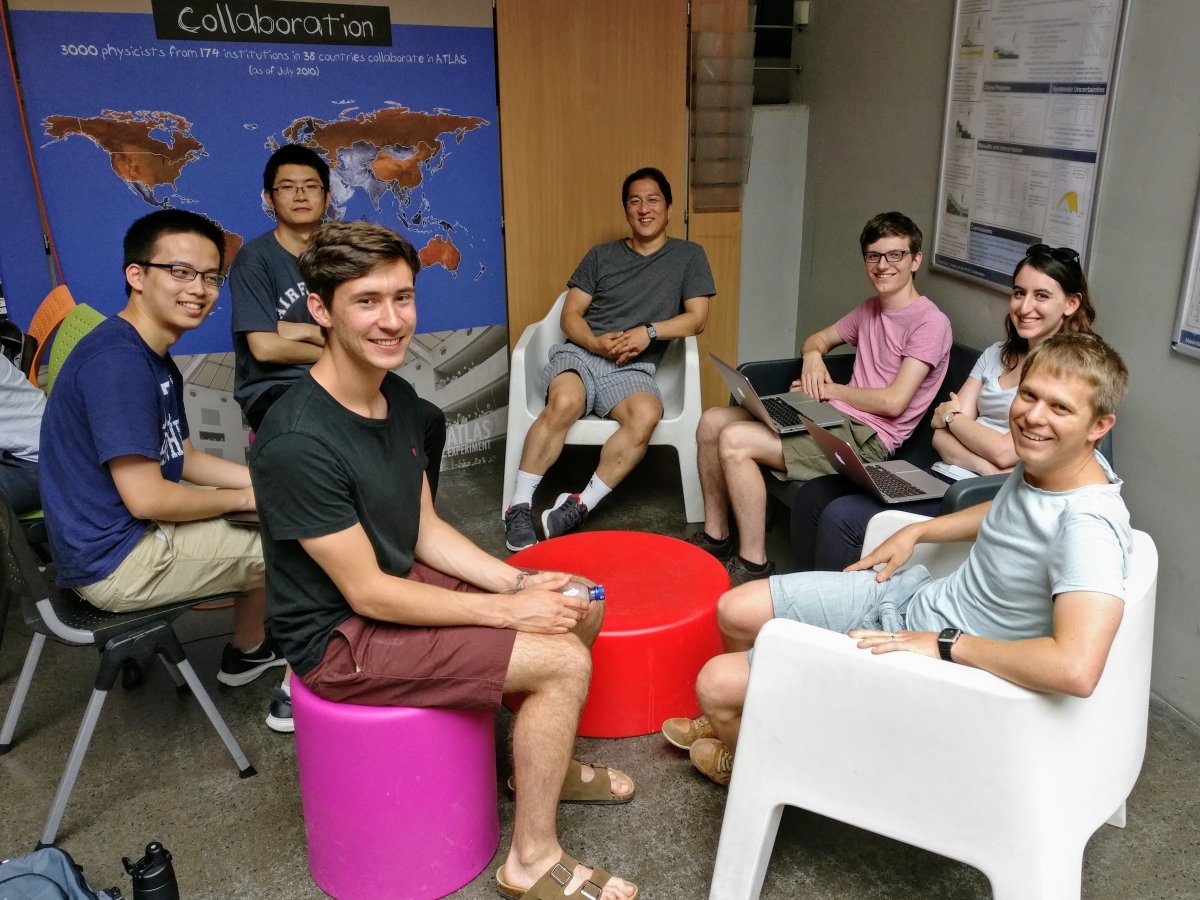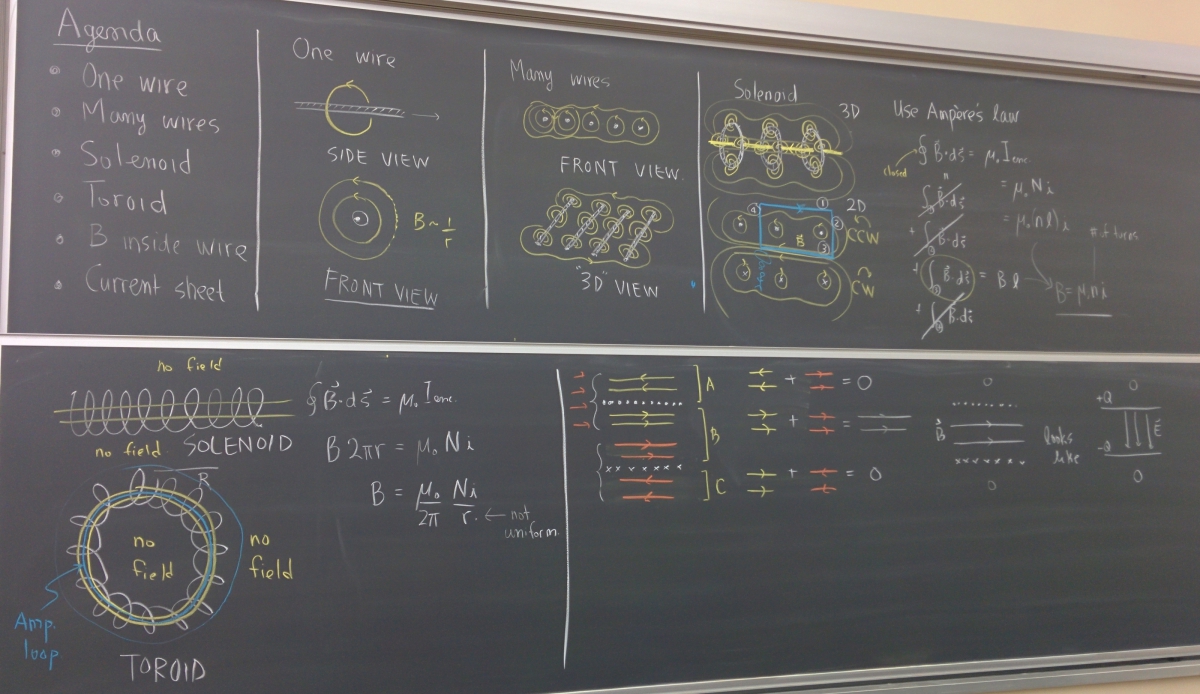Research
Tae Min Hong is an Associate Professor of Physics and Astronomy at the University of Pittsburgh. He is an experimental particle physicist interested in questions related to the fundamental forces of Nature and the basic building blocks of the Universe.
Professor Hong is currently studying proton collisions produced by the Large Hadron Collider (LHC) at the European Organization for Nuclear Research (CERN) in Geneva, Switzerland. As a member of the ATLAS Collaboration of about 3000 physicists, his significant contributions are in the trigger system and the discovery of the Higgs boson.
The Higgs boson is the physical remnant of the once unified interactions of the electromagnetic force and the weak nuclear force. His work in the Higgs focused on its decay to a pair of the charged carriers of the weak force (H → WW) and in its production by the collision of charged and neutral carriers of the weak force (W or Z bosons) called "vector boson fusion" (VBF). His current research involves using similar techniques to search for new fundamental particles such as non-standard Higgs bosons, dark matter candidates, supersymmetric particles, or any such new phenomena. The research touches on three of the five scientific drivers listed by the P5 report: Use the Higgs boson as a new tool for discovery; identify the new physics of dark matter; and explore the unknown: new particles, interactions, and physical principles.
Professor Hong received his AB in physics and mathematics from Harvard University and his MA and PhD in physics from the University of California at Santa Barbara. He worked as a post-doctoral researcher at the University of Pennsylvania before joining the Pitt faculty in 2015. Here is his faculty profile; now in the newspaper! He spent time at SLAC during his PhD. He's been spending time at CERN since his post-doctoral days that continue to today.
2017, Allen Hall
2017, CERN

2022, Carnegie Science Center

2024, NPL
As of 2024 I work with
- Research Assistant Professor Dr. Joerg Stelzer
- Postdoctoral Researcher Dr. Rajat Gupta
- Electrical Engineer Emre Ercikti
- Electrical Engineer Yuvaraj Elangovan
- Electrical Engineer Isabelle Taylor
Former members
- Ava Myers, PhD (2022), former PhD student, became NASA Postdoctoral Fellow, PhD dissertation
- Ben Carlson, PhD, former postdoctoral researcher, tenure-track faculty at Westmont College
Former undergrad students & their projects
- Ava M. '16 on trigger rate monitoring
- Kaelyn S. '18 on VP1 event display, Phase-2 upgrade simulation, brachytherapy
- David D. '18 on VP1 event display, L1calo monitoring
- Andy A. '19 on trigger rate monitoring core software, trigger rate access tools and infrastructure, search for supersymmetry. APS talk. BPhil Thesis
- Dan Z. '20 on trigger rate monitoring core software, trigger menu database, machine learning R&D
- Nick F. '21 on trigger rate monitoring core software, search for invisible decay of the Higgs boson
- Dan S. '21 on firmware engineering
- Steve Ro. '22 on trigger rate monitoring website, machine learning R&D
- Steve Ra. '22 on firmware engineering
- Quincy B. '23 on firmware engineering, machine learning R&D
- Connor M. '23 on trigger rate monitoring core software, dark sector physics
- Will O. '23 on machine learning R&D
- Connor M. '26 on firmware engineering, fast sorting R&D
- Enzo B. '24 on trigger rate monitoring core software, dark sector physics
- Eli U-K. '24 on trigger, machine learning R&D, physics
- Pavel S. '25 on firmware engineering, machine learning R&D
- Santiago C. '25 on trigger, machine learning R&D, physics
Current undergrad students & their projects
- Kyle M. '26 on trigger, muon tracker R&D
- Alex '28 on trigger, OSDE
My students have won
- NASA Space Grant for Undergraduate Research
- Chancellor's Undergraduate Fellowship
- Brackenridge Undergraduate Fellowship
- Emil Sanielevici Undergraduate Research Scholarship
- Halliday-Resnick Award for Execellence in Undergraduate Research
- School of Engineering Summer Undergraduate Internship Award
- Arts & Science Graduate Fellowship
- PITT PACC Graduate Fellowship
I collaborate with the Pittsburgh faculty on the ATLAS experiment. They are Professor Joe Boudreau and Professor Jim Mueller. We share our ATLAS Tier-3 computing center located in the basement of Allen Hall.
If you are an undergraduate student looking for research experience, a graduate student looking for an adviser, or a post-doctoral candidate looking for a research position, please contact him by email.
Selected Publications
Professor Hong is the project lead of a python package to design nanosecond implementation of machine learning / artificial intelligence algorithms on FPGA for use in high energy physics.
- fwXmachina Project at fwx.pitt.edu
Professor Hong is listed as an author of over 800 (as of 2014) published articles in refereed physics journals (see https://inspirehep.net/author/T.M.Hong.1). Here are some representative articles associated with Prof. Hong. Undergraduate co-authors are underlined.
- P. Serhiayenka, S. Roche, B. Carlson, T.M. Hong, Hardware decision trees at the LHC, Nucl. Instrum. and Meth. A (2025) 170209.
- S. Roche, B. Carlson, C.R. Hayes, T.M. Hong, Illuminating all-hadronic final states with a photon: Exotic decays of the Higgs boson to four bottom quarks in vector boson fusion plus gamma at hadron colliders, Phys. Rev. D 109 (2024) 11, 115029.
- S. Roche, Q. Bayer, B. Carlson, W. Ouligian, P. Serhiayenka, J. Stelzer, T.M.Hong, Nanosecond anomaly detection with decision trees for high energy physics and real-time application to exotic Higgs decays, Nature Communications 15, 3527 (2024).
- B. Carlson, Q. Bayer, S. Roche, T.M. Hong, Nanosecond machine learning regression with deep boosted decision trees in FPGA for high energy physics, JINST 17 P09039 (2022).
- ATLAS Collaboration, Search for invisible Higgs-boson decays in events with vector-boson fusion signatures using 139 fb−1 of proton-proton data recorded by the ATLAS experiment, JHEP 08 (2022) 104.
- ATLAS Collaboration, Observation of electroweak production of two jets in association with an isolated photon and missing transverse momentum, and search for a Higgs boson decaying into invisible particles at 13 TeV with the ATLAS detector, Eur. Phys. J. C 82 (2022) 105.
- T. M. Hong, B. Carlson, B. Eubanks, S. Racz, S. Roche, J. Stelzer, D. Stumpp, Nanosecond machine learning event classification with boosted decision trees in FPGA for high energy physics, JINST 16 P08016 (2021).
- ATLAS Collaboration, Searches for electroweak production of supersymmetric particles with compressed mass spectra in √s=13 TeV pp collisions with the ATLAS detector, Phys. Rev. D 101, 052005 (2020).
- ATLAS Collaboration, Search for invisible Higgs boson decays in vector boson fusion using 36.1 fb–1 at √s=13 TeV with the ATLAS detector, Phys. Lett. B 793, 499 (2019).
- T. M. Hong, Dancing with the Higgs Boson, featured article in the AKPA newsletter vol. 32 / no. 1, July 2017, http://akpa.org/images/stories/newsletters/AKPA_Vol_32.pdf.
- T. M. Hong on behalf of ATLAS and CMS Collaborations, Higgs couplings at the LHC, conference proceedings for Blois 2015, ATL-PHYS-PROC-2015-095 (2015), https://cds.cern.ch/record/2057641.
- ATLAS Collaboration, Observation and measurement of Higgs boson decays to WW* with the ATLAS detector, Phys. Rev. D 92, 012006 (2015).
- ATLAS Collaboration, Measurements of Higgs boson production and couplings in diboson final states with the ATLAS detector at the LHC, Phys. Lett. B 726 (2013) 88.
- ATLAS Collaboration, Observation of a new particle in the search for the Standard Model Higgs boson with the ATLAS detector at the LHC, Phys. Lett. B 716 (2012) 1.
- ATLAS Collaboration, Search for the Standard Model Higgs boson in the H→WW(*) →lνlν decay mode with 4.7 fb–1 of ATLAS data at √s=7 TeV, Phys. Lett. B 716 (2012) 62.
- ATLAS Collaboration, Measurement of the ZZ production cross section and limits on anomalous neutral triple gauge couplings in proton-proton collisions at √s = 7 TeV with the ATLAS detector, Phys. Rev. Lett. 108 (2012) 041804.
- BaBar Collaboration, Observation and study of the baryonic B-meson decays B → D(*)pp(π)(π), Phys. Rev. D 85 (2012) 092017.
Recent seminars / invited talks
- Talk, Artificial Intelligence for the Electron Ion Collider (2025) [link], MIT, Oct. 27, 2025.
- Talk, Large Hadron Collider Physics Conference 2025 [link], Taipei, Taiwan, May 5, 2025.
- Talk, Decision tree *coder on FPGA, HP Labs "AI Tech Talk" biweekly seminar series, Milpitas, Jan. 9, 2025.
- Talk, Streaming Readout Workshop SRO-XII [link], Tokyo, Japan, Dec. 3, 2024
- Talk, fwXmachina part 1: Classification with boosted decision trees on FPGA for L1 trigger, Fast Machine Learning for Science Workshop 2023 [link], London, Sep. 25, 2023.
- Talk, Dark matter searches with ATLAS [pdf], July 17, 2023. The 11th International Conference on Frontiers in New Physics, Crete, Greece. https://indico.cern.ch/event/1199102
- Talk, Invisible Higgs & trigger challenges on ATLAS: A discussion on Dark sector, Higgs boson, Trigger, and ML/AI on FPGA, May 23, 2023. Seminar at the PKU-SJTU Collider Physics Forum for Junior Scholars, virtual. https://indico-tdli.sjtu.edu.cn/event/1690
- Seminar, Invisible Higgs decays & trigger challenges at the LHC [pdf], Sep. 28, 2021. University of Geneva, Switzerland.
- Talk, Dark matter searches at the LHC [pdf], May 17, 2017. Fifth Annual Conference on Large Hadron Collider Physics, Shanghai, China. http://lhcp2017.physics.sjtu.edu.cn
- Talk, Dark matter searches with ATLAS [pdf, video], May 12, 2017. South American Dark Matter Workshop, ICTP-SAIFR, Sao Paulo, Brazil. http://www.ictp-saifr.org/?page_id=14295
- Seminar, Higgs' invisible branching fraction at the LHC [pdf], April 28, 2016. Particle Physics Seminar at the Brookhaven National Laboratory, Upton, NY. https://indico.bnl.gov/conferenceDisplay.py?confId=1765
- Seminar, Higgs' invisible branching fraction at the LHC, June 20, 2016. Seminar at the Institute for Theoretical Physics, University of Heidelberg, Heidelberg, Germany.
- Talk, Higgs boson couplings, from combination of all channels [pdf, paper], June 3, 2015. The 27th Rencontres de Blois in Particle Physics and Cosmology, Blois, France. http://blois.in2p3.fr/2015/
- Talk, Higgs boson decay to WW in the lvlv channel with ATLAS [pdf, video], July 26, 2013. The 4th Higgs Hunting Conference, Orsay, France. http://events.lal.in2p3.fr/conferences/higgshunting2013/
- Talk, Recent reslts from Higgs boson searches at ATLAS [pdf], October 20, 2011. Brookhaven Forum 2011: A First Glimpse at the Tera Scale, Upton, NY. https://www.bnl.gov/bf2011/
- Talk, Hot topics at BaBar [pdf], March 16, 2009. Moriond QCD and High Energy Interactions Conference, Moriond, Italy. http://moriond.in2p3.fr/QCD/2009/MorQCD09Prog.html
Patent
-
Nanosecond execution of machine learning algorithms and nanosecond anomaly detection and encoded data transmission using autoencoders with decision tree grid in field programmable gate array and other electronic devices, US Patent and Trade Office Publication No. US 20240054399 A1, Publication Date 2024-02-15.
Teaching
| Term | Course | Description |
| 2015 Spring | PHYS 0175 | Undergraduate introductory E&M |
| 2015 Fall | PHYS 0175 | Undergraduate introductory E&M |
| 2016 Spring | - | Research. At BNL as US ATLAS Scholar |
| 2016 Fall | - | Research. At CERN. |
| 2017 Spring | PHYS 1378 | Undergraduate particle physics |
| 2017 Fall | PHYS 0175 | Undergraduate introductory E&M |
| 2018 Spring | PHYS 3770 | Graduate seminar: Special topics in LHC Physics |
| 2018 Fall | PHYS 0175 | Undergraduate introductory E&M |
| 2019 Spring | PHYS 1378 | Undergraduate particle physics |
| 2019 Fall | - | Research. At CERN. |
| 2020 Spring | PHYS 0476 | Undergraduate honors introductory E&M |
| 2020 Fall | PHYS 1351 | Intermediate E&M |
| 2021 Spring | PHYS 0476 | Undergraduate honors introductory E&M |
| 2021 Fall | - | Research. At CERN. |
| 2022 Spring | PHYS 0476 | Undergraduate honors introductory E&M |
| 2022 Fall | PHYS 0174 | Undergraduate introductory mechanics |
| 2023 Spring |
PHYS 0476
PHYS 1902
|
Undergraduate honors introductory E&M
Directed reading: Topics in experimental high energy physics
|
| 2023 Fall | - | Research. At SLAC. |
| 2024 Spring | PHYS 1378 | Undergraduate particle physics |
| 2024 Fall | PHYS 0081 | Undergraduate "Space and Time / Light and Matter" |
| 2025 Spring | PHYS 0091 | Undergraduate conceptual physics |
PHYS 0175 is a large class with about 150 students, but with the help of TAs and UTAs I run the class as if it's a small course. I end up knowing most students who attend the lectures. My style is to use the blackboard for lectures and incorporate handwritten assignments to give students feedback.

